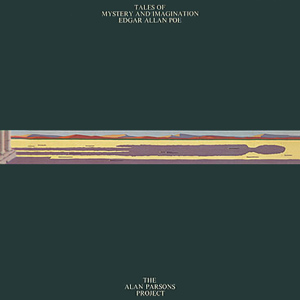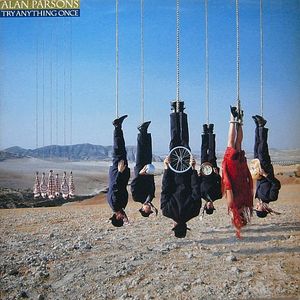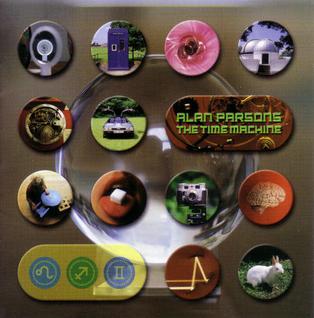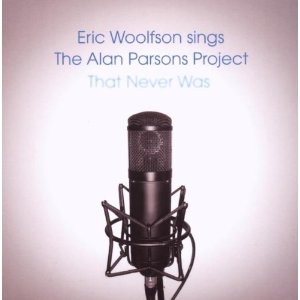
The Alan Parsons Project were a British rock band active between 1975 and 1990, whose core membership consisted of producer, audio engineer, musician and composer Alan Parsons, and singer, songwriter and pianist Eric Woolfson. They shared writing credits on almost all of their songs, with Parsons producing or co-producing all of the recordings, while being accompanied by various session musicians, some relatively consistent.

Tales of Mystery and Imagination (Edgar Allan Poe) is the debut studio album by British rock band the Alan Parsons Project. It was released on 25 June 1976 in the United Kingdom and Ireland by Charisma Records and 20th Century Records in the rest of the world. The lyrical and musical themes of the album, which are retellings of horror stories and poetry by Edgar Allan Poe, attracted a cult audience. The title of the album is taken from the title of a collection of Poe's macabre stories of the same name.

Pyramid is the third album by progressive rock band The Alan Parsons Project, released in May 1978. It is a concept album centred on the pyramids of Giza. At the time the album was conceived, interest in pyramid power and Tutankhamun was widespread in the US and the UK. Pyramid was nominated for the 1978 Grammy Award for Best Engineered Album, Non-Classical.

Eve is the fourth studio album by British rock band the Alan Parsons Project, released in September 1979 by Arista Records. The album's focus is on the strength and characteristics of women, and the problems they face in the world of men. It had originally been intended to focus on "great women in history", but evolved into a wider concept. The album name was the same as Eric Woolfson's mother-in-law.

The Turn of a Friendly Card is the fifth studio album by the British progressive rock band the Alan Parsons Project, released in 1980 by Arista Records. The title piece, which appears on side 2 of the LP, is a 16-minute suite broken up into five tracks. The Turn of a Friendly Card spawned the hits "Games People Play" and "Time", the latter of which was Eric Woolfson's first lead vocal appearance. An edited version of the title piece combining the opening and ending parts of the suite was also released as a single along with an official video.

Stereotomy is the ninth studio album by the Alan Parsons Project, released in 1985.

Vulture Culture is the eighth studio album by the Alan Parsons Project, released in March 1985 via the Arista label.

Gaudi is the tenth album by The Alan Parsons Project, released in 1987. Gaudi refers to Antoni Gaudí, the Catalan Spanish architect, and the opening track references what is probably Gaudí's best known building, the Sagrada Família.

Try Anything Once is the first solo album by Alan Parsons, released in 1993. It was his first album following the split of the Alan Parsons Project.

The Time Machine is the third solo album by English rock musician Alan Parsons.

David Paton is a Scottish bassist, guitarist and singer. He first achieved success in the mid-1970s as lead vocalist and bassist of Pilot, who scored hits with "Magic", "January", "Just a Smile" and "Call Me Round" before splitting in 1977. Paton is also known for his work in the original lineup of The Alan Parsons Project (1975-1985), and for working with acts such as Kate Bush, Camel and Elton John.

Freudiana is a rock opera by Eric Woolfson. It was to be the 11th album by the Alan Parsons Project, but during its development, Woolfson had creative differences with Alan Parsons. The production, released in 1990, utilizes the Project's personnel as well as many guest vocalists.
"(The System of) Dr. Tarr and Professor Fether" is a 1976 single by the Alan Parsons Project. It first appeared on their debut album, Tales of Mystery and Imagination: Edgar Allan Poe. The single reached number 37 on the US Billboard Hot 100 and number 62 in Canada.
"The Raven" is the first song by the Alan Parsons Project, recorded in April 1976 at Mama Jo's Studio, North Hollywood, Los Angeles. It is the second track on their debut album, Tales of Mystery and Imagination, which is a tribute to author and poet Edgar Allan Poe. Though the song is based on Poe's poem of the same name, and is almost a verbatim recital of the lyrics of the poem, Poe is not given song writing credit. It is credited to Alan Parsons and Eric Woolfson.

The Essential Alan Parsons Project is a compilation album released by English progressive rock musician Alan Parsons and the Alan Parsons Project on 6 February 2007. It was released through Sony BMG as part of The Essential album series. The album featured some of the band's best known songs as well as some rare tracks.
Keats were a short-lived British rock band, which produced one eponymous album in 1984. It was an Alan Parsons Project offshoot. Its members were Colin Blunstone (vocals), Ian Bairnson (guitars), Pete Bardens (keyboards), David Paton and Stuart Elliott. Richard Cottle also provided additional keyboard parts, as well as saxophone and synthesizers.
Stuart Alexander Elliott is an English drummer, composer and producer. He was the original drummer for Steve Harley and Cockney Rebel and during his time with this band he became a session drummer playing for top artists such as Kate Bush, Al Stewart, The Alan Parsons Project, Roger Daltrey, Paul McCartney, Claudio Baglioni, Lucio Battisti, among others.

Crusader is the fourth album by British-Irish singer-songwriter Chris de Burgh, released in 1979 by A&M Records. The album was produced by Andrew Powell, who worked with the Alan Parsons Project on many of their albums. The musicians on Crusader also came from the Alan Parsons Project.

Eric Woolfson sings The Alan Parsons Project That Never Was is an album by the progressive rock musician Eric Woolfson, co-creator with Alan Parsons of The Alan Parsons Project, as well as main songwriter and manager of the band. Released in 2009, this was Woolfson's final album before he died of cancer in December of that year. The album includes songs that remained unreleased since the Project time for various reasons; however, as Woolfson himself remarks in the booklet, Parsons' dislike for some of Woolfson's compositions would have often caused them to be excluded from a Project album in its very early stages - such as, for example, "Steal Your Heart Away", an "unashamedly commercial" song with a conventionally sentimental lyric, which Parsons, in Woolfson's words, would have absolutely detested. "Somewhere in the Audience" and "Immortal" are slightly re-arranged and re-recorded versions of two of Woolfson's demos for his 2003 musical about Edgar Allan Poe; the final versions of these songs, sung by the musical's protagonist Steve Balsamo, are featured on the album Poe: More Tales of Mystery and Imagination. "Train to Wuxi" was the original version of "Train to Freedom", which is also included in the Poe musical and features Woolfson's one and only guitar solo.

Alan Parsons Live is the first live album by Alan Parsons, recorded in May 1994 during his European tour, and released late that year by Arcade Records in Europe. RCA/BMG added three new studio tracks and changed the cover art when releasing the album in the rest of the world in 1995, renaming it The Very Best Live; stylized on the cover with "The Very Best" in a smaller font between Alan Parsons and Live. Despite the tour promoting Try Anything Once with seven songs from the album in the setlist, the live performances on the album are all songs from his years with The Alan Parsons Project.
















